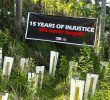V. RECOMMENDATIONS
The Commission�s recommendations, which mostly fall within the Principles on the Effective Prevention and Investigation of Extra-legal, Arbitrary and Summary Executions, recommended by the Economic and Social Council of the United Nations on May 24, 1989, are as follows:
A. Political will
With respect to the recent killing of Abra Representative Luis Bersamin, Jr., the President vowed that the perpetrators, mastermind, and all, will be brought to justice. As regards the communist insurgency, the President has ordered the armed forces to crush it within two years.
In the field of extralegal killings, it is urged that the President reiterate in the strongest possible manner her expressions or pronouncements of determination and firm resolve to stop the same. If extrajudicial executions are to be stopped, the political will to do what is right however great the cost must pervade all levels of government so that our beloved country can move towards the greater ideals of democracy and justice; it must start with the President who must pursue the prevention and prosecution of extrajudicial killings with urgency and fervor.
As recommended by Amnesty International, the Government must consistently and at all levels condemn political killings. The President and all the departments of the Government should make clear to all members of the police and military forces that extrajudicial executions will not be countenanced under any circumstances.
B. Investigation
To ensure that all reports and complaints of extrajudicial killings against the military are investigated promptly, impartially, and effectively, the investigation must be conducted by a body or agency independent from the armed forces. This civilian investigative agency should be independent of, and not under the command, control, or influence of the Armed Forces, and it must have control of its own budget. The personnel must be civilian agents well trained in law enforcement and investigative work and equipped with the necessary array of technical devices to enhance their investigative capabilities. They must be authorized to execute warrants and make arrests. They must be provided with an adequate forensic laboratory and other technical services. In the United States, the Army�s professional investigative agency is called the Criminal Investigation Division; the Air Force�s is called the Office of Special Investigation; the Navy and Marines are serviced by the Naval Criminal Investigation Service; and for the Coast Guard, the organization is called the Coast Guard Investigation Service. Our armed forces is not so big as to require separate agencies for its services. A single investigating body will be enough. The President should recommend legislation to Congress for the creation of a similar investigation agency to look into and prosecute complaints against military personnel.
On the part of the PNP, the law that created the National Police Commission (Rep. Act No. 6995) should be amended and strengthened to ensure the thorough and impartial investigation of erring police officers by personnel not under the control of the PNP command.
In the conduct of the investigation of extrajudicial killing of activists, or of any case for that matter, the PNP must be enjoined to ensure that the evidence must be strong and sufficient for conviction. The present policy of the PNP � as confirmed by Police Deputy Director General Avelino Razon, Jr. in his testimony before the Commission � to consider their job done or finished from the moment they have filed the complaint with the office of the public prosecutor has inevitably encouraged sloppy and shoddy investigations; it is not infrequent that police investigators, especially in remote areas, would file a case with the office of the public prosecutor, no matter how inadequate the evidence is, just so they can say that the case has been solved and if it is later dismissed for insufficiency of evidence they blame the prosecutor for incompetence or for being corrupt.
The office of the public prosecutor in each province or city must assign prosecutors to review all complaints filed by the police to evaluate the sufficiency of evidence not only to determine the existence of probable cause but also for conviction. If the reviewing prosecutor is of the opinion that the evidence is insufficient, then he must reject the complaint and return it to the police, indicating what additional evidence is needed. Once a complaint is accepted after such review, it means that there is enough evidence for a successful prosecution. This will avoid finger pointing on who is to blame for the dismissal of a case or acquittal of the accused and, more importantly, compel the police to do a thorough job in the investigation of every case.
If after the lapse of six (6) months from the commission of the extrajudicial killing of an activist or media personality the investigation by PNP has not yielded any positive result, the police personnel in charge must request the NBI to take over the investigation. For this purpose, the NBI must be provided with the necessary funds and allowed to hire additional personnel if necessary.
Extrajudicial Killings, Melo Commission Report on Extrajudicial Killings









